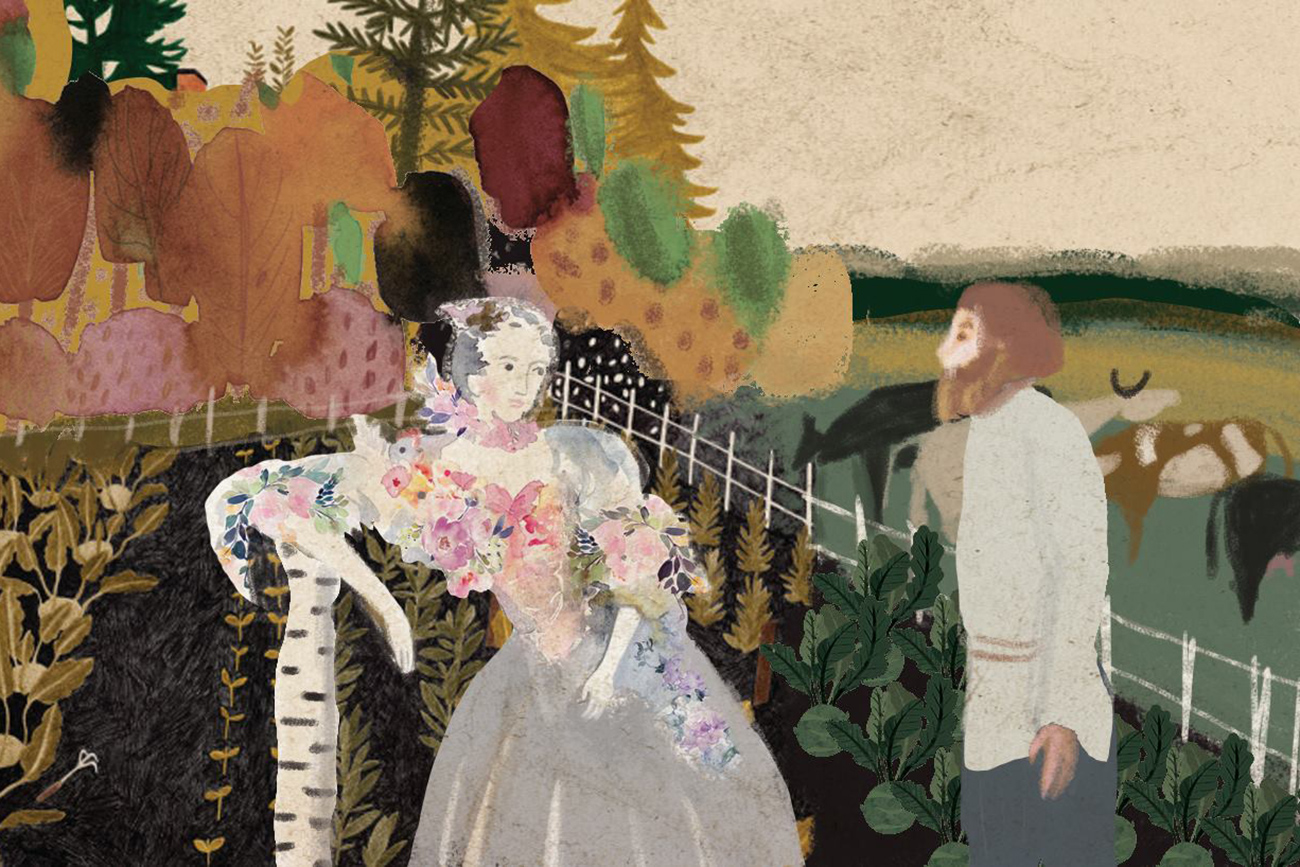
In the 18th century French "conquered" Russia, becoming the unofficial language of the aristocracy.
Ekaterina LobanovaLeo Tolstoy's novel War and Peace remains one of the most difficult books for pupils on the school syllabus in modern Russia, and not just because of its impressive four-volumes. "When I opened the first pages and saw that about half of the text was in French, I thought: Well, I'd better read a brief summary instead," says 23-year-old Muscovite Alexei about his school experience of reading Tolstoy.
Indeed, the dialogues between members of the St. Petersburg nobility in the salon of high-society hostess Anna Pavlovna Scherer that War and Peace opens with are half composed of French phrases, and this is not the author's invention but a reflection of the mores of the early 19th century (the first volume of War and Peace describes the events of 1805). As Tolstoy observes one of his characters: "He spoke in that refined French in which our grandfathers not only spoke but thought." In the 18th century French "conquered" Russia, becoming the unofficial language of the aristocracy. Why?
It all started with the reforms of Peter the Great, who ruled Russia from 1682 to 1725. Peter, the third of the Romanov tsars, drastically changed the direction in which the country was moving - his dream was to turn Russia into a European power. To achieve this, he not only engaged in wars but also destroyed the patriarchal ways of old Russia: He forced nobles to cut their beards, wear European dress, and travel to the West to study. As a result, noblemen at high-society gatherings in the 18th century started conversing in foreign languages.
Of all the Western languages it was French that dominated during that period, not just in Russia but in Europe as a whole. "French was the first language which introduced the notion of a single set of norms," is how psycholinguist and translator Dmitry Petrov explains the success of the French language. France's First Minister Cardinal de Richelieu should be thanked for this, Petrov says. In 1635 Richelieu founded the French Academy which dealt with the creation and regulation of a set of language norms. In the end, French gradually squeezed out Latin as a language of international communication.
The French Revolution (1789-1799) gave an additional impetus to the French language's spread among the Russian nobility. Many aristocrats fled the country after it was engulfed in rebellion and found refuge, inter alia, in Russia. The number of émigrés in that period reached 15,000.
The government of the Russian Empire treated any revolution with suspicion and welcomed monarchists in their country. Some of them achieved high positions serving the Russian throne - such as Armand-Emmanuel Richelieu, a descendant of the famous cardinal, who became governor of Odessa (now Ukrainian territory). Others, not so successful, became governors in rich families and taught dancing and fencing to the children of noblemen.
Long before Tolstoy, journalists and writers had noted the Russian nobility's wholesale infatuation with everything French - and there were heated debates about the craze. Some people thought that loans from the French enriched Russian culture and added refinement to the language, while others believed they led nowhere. "We will drive our own language into total decline," commented People's Education Minister Alexander Shishkov, who campaigned for the purity of Russian.
In his comedy "Woe from Wit" (1825), the writer Alexander Griboyedov referred ironically to Russians who worshipped everything French while being unable to string two words together in the language, summing up the phenomenon in the phrase: "A mixture of French and Nizhny Novgorod" (Nizhny Novgorod is a provincial town 401 km east of Moscow). And yet all the nobility conversed in French - it was a courtly language associated with chivalry and exalted feelings. A study of the correspondence of the most famous Russian poet, Alexander Pushkin, who is regarded as the founder of the modern Russian language, revealed that about 90 percent of his letters to women were in French.
During the Napoleonic Wars, in which Russia and France fought on opposite sides, the popularity of French began to wane. Patriotic sentiments compelled the nobles to speak more in their native tongue - and sometimes it was a matter of survival. Poet and hero of the War of 1812 Denis Davydov recalled that the peasants (who knew no French and were frequently illiterate) at times "mistook [aristocratic officers] for the enemy because of their foreign accent in Russian" and could attack them with an ax or take a shot at them with a firearm.
The period of infatuation with France came to an end and many Gallicisms that had entered the Russian language in the 18th century fell into oblivion, but dozens of words nevertheless remained. Russians do not think twice of the foreign origin of words like "afisha," "pressa," "sharm," and "kavaler" [meaning "advertising poster," "press," "charm," and "male admirer," respectively]. "Some remained if they were needed by the language, but others disappeared if they were surplus to requirements," said the writer Pyotr Vail in a comment on the history of loan words. "The same thing is happening and will continue to happen with other words grafted onto the language."
This article is part of the "Why Russia…?" series in which RBTH answers popular questions about Russia.
If using any of Russia Beyond's content, partly or in full, always provide an active hyperlink to the original material.
Subscribe
to our newsletter!
Get the week's best stories straight to your inbox